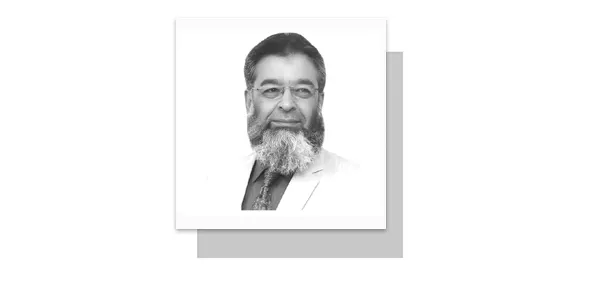ALTHOUGH I was born four years after the Indo-Pak war of 1965, the stories I read and heard throughout my childhood spoke of a resolute Pakistan defeating India from all sides.
That war was fought with valor and strategic brilliance. However, the battlefield was only the beginning. India, bruised yet unbroken, resorted to covert tactics after its defeat. It turned to a more insidious form of warfare—a proxy war that would, within a few years, dissociate the eastern wing of Pakistan apart and result in the creation of Bangladesh. History teaches us not to trust the intentions of an adversary whose very identity thrives on enmity.
After almost six decades later, Pakistan once again faces the same nefarious design. On May 7, 2025, India launched an act of aggression under the banner of Operation Sindoor, only to be compelled to raise the white flag in the face of Pakistan’s determined response through Operation Bunyan al-Marsus. Yet again, a defeated India resorted to a covert proxy war. The methods remain unchanged—only the region has shifted. Where Bengali nationalism was once incited and armed, Baloch nationalism is now being exploited with the same cunning. The names of the agents may differ, but their function remains the same. The insurgency strategy is all too familiar: fomenting ethnic divisions, sowing distrust against the federation and promoting rebellion under the guise of independence.
This is no mere speculation. The statistics speak for themselves. According to the latest biannual data issued by the Home Department of Balochistan, terrorism has surged alarmingly. In just the first six months of this year, a staggering 501 terrorism-related incidents occurred across the province. These attacks resulted in the loss of 257 lives, including 133 security personnel and left 492 injured—among them 238 security officials. Notably, the number of terrorist attacks rose by 45%, while the targeted killings of non-local settlers doubled, increasing by 100%.
In 14 separate attacks on settler individuals, 52 people were killed and 11 wounded solely because of their ethnicity or perceived affiliation. A total of 81 bombings, hand grenade assaults, IEDs, landmine explosions and rocket attacks claimed 26 lives and injured 112 more. There were also 39 attacks directly targeting ordinary citizens, killing 11 and wounding 29. In one of the most horrifying incidents, two separate attacks on trains during this period resulted in the death of 29 innocent passengers. Even humanitarian efforts were not spared—a polio worker was killed in a targeted attack. Moreover, nine assaults on mobile phone towers injured two and aimed to disrupt basic communication infrastructure.
These are not random acts of violence—they are the hallmarks of an orchestrated insurgency aimed at destabilizing Pakistan internally. The Mukti Bahini, the so-called “Liberation Army” of East Pakistan, was not merely a local movement of discontent. It was a well-orchestrated and externally funded insurgency. Trained and armed under India’s Operation Jackpot, the Mukti Bahini specialized in guerrilla tactics — ambushes, sabotage and coastal raids—that left the Pakistani military overstretched and disoriented. The role of India’s Research and Analysis Wing (RAW) and Directorate of Naval Intelligence was no secret. Nor was the involvement of Israel, which clandestinely supplied arms in return for diplomatic favours. It was, in essence, an international campaign to dismember Pakistan. The political fuel came from the Awami League, whose leadership—particularly Sheikh Mujibur Rahman—had long been agitating for autonomy and, eventually, secession. Following Mujib’s arrest in 1971, his loyalists formed a sub-faction, the Mujib Bahini, which played an even more direct role in the insurgency.
In a startling moment of candour during his 2015 visit to Bangladesh, Indian Prime Minister Narendra Modi admitted India’s decisive role in the events of 1971. His words—“We fought together, we sacrificed together and we won together”—laid bare a historical truth that had long been whispered but seldom acknowledged so openly. That confession did not just echo through South Asia; it exposed a doctrine of interventionism that continues to haunt the region today.
The parallels between the Mukti Bahini and the Baloch Liberation Army (BLA) are too striking to ignore. The BLA, formed officially in the early 2000s but inspired by older Baloch separatist movements, mimics the same strategy of asymmetric warfare. The targets have changed—now it is Chinese nationals, infrastructure projects under the China-Pakistan Economic Corridor (CPEC) and Punjabi settlers—but the goal remains consistent; to fragment Pakistan by fomenting ethnic hatred and sabotaging national integration. Their ideology cloaks itself in Baloch nationalism and secularism, yet it reeks of ethnic cleansing and calculated terrorism.
Pakistan has consistently accused India’s RAW of supporting the Baloch Liberation Army (BLA), drawing parallels with its past backing of the Mukti Bahini. The 2016 arrest of Indian naval officer Kulbhushan Jadhav, who confessed to aiding Baloch militants, lent credibility to these claims. Reports also suggest BLA operatives receive medical and logistical support in India, mirroring the safe havens once offered to East Pakistan’s insurgents. What is most alarming is the BLA’s systematic violence against civilians—particularly Punjabis—murdered solely for their ethnicity. The China-Pakistan Economic Corridor (CPEC), vital for Pakistan’s future, has become a prime target, with Chinese workers abducted or killed to sabotage progress and sow fear.
While external interference is undeniable, internal failings cannot be ignored. Neglect or incompetence by state elements has allowed separatist sentiments to fester. Ultimately, it is Pakistan that bleeds—its people who suffer and its unity that is shaken. Just as in 1971, the enemy’s first victory lies in infiltrating minds and hearts. Pakistan must recognize these signs not as isolated acts but as part of a larger threat. Only vigilance, unity and reflection on past lessons can safeguard the nation from repeating history’s grave mistakes.
—The writer is contributing columnist, based in Islamabad.
(ememiqbal68@gmail.com)


















